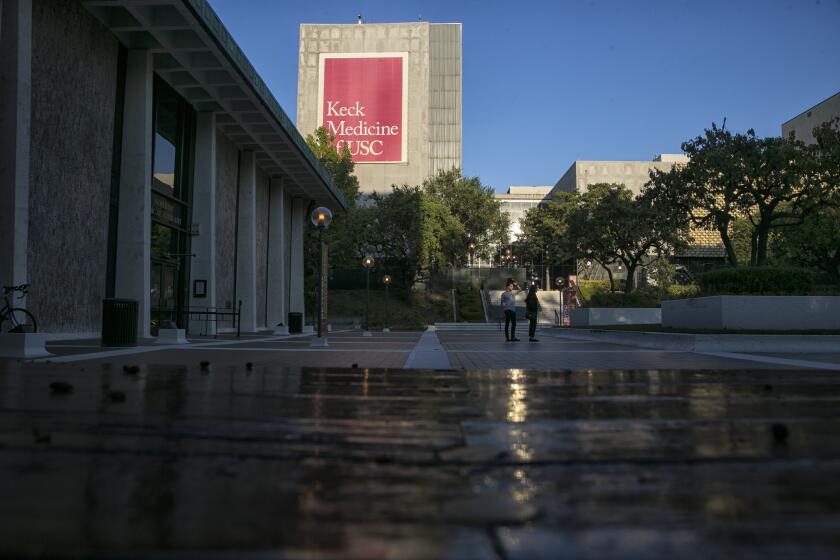Corinne Purtill is a science and medicine reporter for the Los Angeles Times. Her writing on science and human behavior has appeared in the New Yorker, the New York Times, Time Magazine, the BBC, Quartz and elsewhere. Before joining The Times, she worked as the senior London correspondent for GlobalPost (now PRI) and as a reporter and assignment editor at the Cambodia Daily in Phnom Penh. She is a native of Southern California and a graduate of Stanford University.
1
Late last year, a group of whistleblowers submitted a report to the National Institutes of Health that questioned the integrity of a celebrated USC neuroscientist’s research and the safety of an experimental stroke treatment his company was developing.
NIH has since paused clinical trials for 3K3A-APC, a stroke drug sponsored by ZZ Biotech, a Houston-based company co-founded by Berislav V. Zlokovic, professor and chair of the department of physiology and neuroscience at the Keck School of Medicine of USC.
Three of Zlokovic’s research papers have been retracted by the journal that published them because of problems with their data or images. Journals have issued corrections for seven more papers in which Zlokovic is the only common author, with one receiving a second correction after the new supplied data were found to have problems as well.
For an 11th paper co-authored by Zlokovic the journal Nature Medicine issued an expression of concern, a note journals append to articles when they have reason to believe there may be a problem with the paper but have not conclusively proven so. Since Zlokovic and his co-authors no longer had the original data for one of the questioned figures, the editors wrote, “[r]eaders are therefore alerted to interpret these results with caution.”
“It’s quite unusual to see this volume of retractions, corrections and expressions of concern, especially in high-tier influential papers,” said Dr. Matthew Schrag, an assistant professor of neurology at Vanderbilt who co-authored the whistleblower report independently of his work at the university.
Both Zlokovic and representatives for USC declined to comment, citing an ongoing review initiated in the wake of the allegations, which were first reported in the journal Science.
“USC takes any allegations of research integrity very seriously,” the university said in a statement. “Consistent with federal regulations and USC policies, this review must be kept confidential.”
Accusations against USC’s Berislav Zlokovic were made by a small group of independent researchers and reported in the journal Science.
Zlokovic “remains committed to cooperating with and respecting that process, although it is unfortunately required due to allegations that are based on incorrect information and faulty premises,” his attorney Alfredo X. Jarrin wrote in an email.
Regarding the articles, “corrections and retractions are a normal and necessary part of the scientific post-publication process,” Jarrin wrote.
Authors of the whistleblower report and academic integrity experts challenged that assertion.
“If these are honest errors, then the authors should be able to show the actual original data,” said Elisabeth Bik, a microbiologist and scientific integrity consultant who co-wrote the whistleblower report. “It is totally human to make errors, but there are a lot of errors found in these papers. And some of the findings are suggestive of image manipulation.”
Given the staid pace of academic publishing, publishing this many corrections and retractions only a few months after the initial concerns were raised “is, bizarrely, pretty quick,” said Ivan Oransky, co-founder of Retraction Watch.
The whistleblower report submitted to NIH identified allegedly doctored images and data in 35 research papers in which Zlokovic was the sole common author.
“There had been rumblings about things not being reproducible [in Zlokovic’s research] for quite some time,” Schrag said. “The real motivation to speak publicly is that some of his work reached a stage where it was being used to justify clinical trials. And I think that when you have data that may be unreliable as the foundation for that kind of an experiment, the stakes are just so much higher. You’re talking about patients who are often at the most vulnerable medical moment of their life.”
After the devastation of the COVID-19 pandemic, the World Health Organization and leaders worldwide vowed to do better next time but are still struggling to finalize a global plan.
Over the years, Zlokovic has created several biotech companies aimed at commercializing his scientific work. In 2007, he co-founded ZZ Biotech, which has been working to gain federal approval of 3K3A-APC.
The drug is intended to minimize the bleeding and subsequent brain damage that can occur after an ischemic stroke, in which a blood clot forms in an artery leading to the brain.
In 2022, USC’s Keck School of Medicine received from NIH the first $4 million of a planned $30-million grant to conduct Phase III trials of the experimental stroke treatment on 1,400 people.
In Phase II of the trial, which was published in 2018 and called Rhapsody, six of the 66 patients who received 3K3A-APC died in the first week after their stroke, compared to one person among the 44 patients who got a placebo. Patients who received the drug also tended to report more disability 90 days after their stroke than those who got the placebo. The differences between the two groups were not statistically significant and could have been due to chance, and the death rate for patients in both groups evened out one month after the initial stroke.
“The statements that there is a risk in this trial is false,” said Patrick Lyden, a USC neurologist and stroke expert who was employed by Cedars-Sinai at the time of the trial. Zlokovic worked with Lyden as a co-investigator on the study.
One correction has been issued to the paper describing the Phase II results, fixing an extra line in a data table that shifted some numbers to the wrong columns. “This mistake is mine. It’s not anybody else’s. I didn’t catch it in multiple readings,” Lyden said, adding that he noticed the error and was already working on the correction when the journal contacted him about it.
He disputed that the trial represented any undue risk to patients.
“I believe it’s safe, especially when you consider that the purpose of Rhapsody was to find a dose — the maximum dose — that was tolerated by the patients without risk, and the Rhapsody trial succeeded in doing that. We did not find any dose that was too high to limit proceeding to Phase III. It’s time to proceed with Phase III.”
Schrag stressed that the whistleblowers did not find evidence of manipulated data in the report from the Phase II trial. But given the errors and alleged data manipulation in Zlokovic’s earlier work, he said, it’s appropriate to scrutinize a clinical trial that would administer the product of his research to people in life-threatening situations.
In the Phase II data, “there’s a coherent pattern of [patient] outcomes trending in the wrong direction. There’s a signal in early mortality … there’s a trend toward worse disability numbers” for patients who received the drug instead of a placebo, he said.
None are “conclusive proof of harm,” he said. But “when you’re seeing a red flag or a trend in the clinical trial, I would tend to give that more weight in the setting of serious ethical concerns around the pre-clinical data.”
Answering the basics on Bird Flu 2024
The NIH paused the clinical trial in November, and it remains on hold, said Dr. Pooja Khatr, principal investigator of the NIH StrokeNet National Coordinating Center. Khatr declined to comment on the pause or the trial’s future, referring further questions to USC and NIH.
The NIH Office of Extramural Research declined to discuss Rhapsody or Zlokovic, citing confidentiality regarding grant deliberations.
ZZ Biotech Chief Executive Kent Pryor, who in 2022 called the drug “a potential game-changer,” said he had no comment or information on the halted trial.
Zlokovic is a leading researcher on the blood-brain barrier, with particular interest in its role in stroke and dementia. He received his medical degree and doctorate in physiology at the University of Belgrade and joined the faculty at USC’s Keck School of Medicine after several fellowships in London. A polyglot and amateur opera singer, Zlokovic left USC and spent 11 years at the University of Rochester before returning in 2011. He was appointed director of USC’s Zilkha Neurogenetic Institute the following year.
A USC spokesperson confirmed that Zlokovic has retained his titles as department chair and director of the Zilkha institute.
About this article
Times staff writer Melody Petersen contributed to this report.








